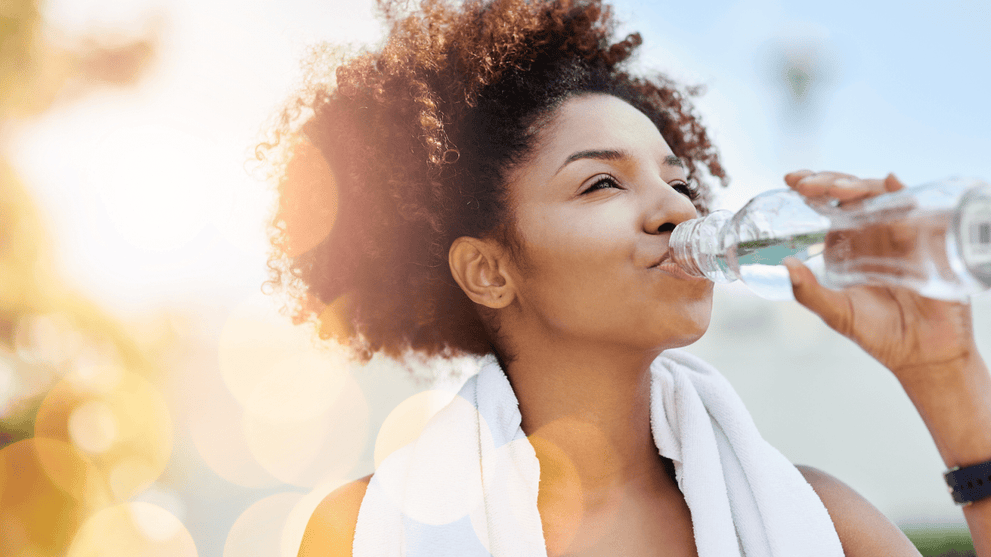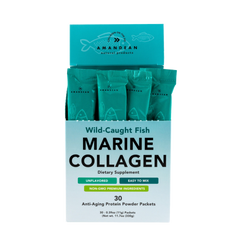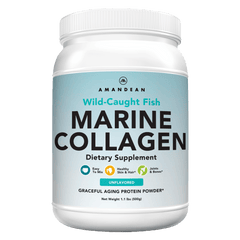Your Cart is Empty


What Is Collagen Good For And How Does It Support Whole-Body Health?
Andjela Rupic
Key Takeaways:
- Collagen supports skin, joints, and gut health by reinforcing the body's structural proteins, improving elasticity, mobility, and digestion.
- Different types of collagen—especially Types I, II, and III—play unique roles in beauty, joint support, and muscle recovery, making supplementation a tailored solution.
- For best results, choose high-quality, hydrolyzed collagen that’s clean, bioavailable, and aligned with your dietary needs, like Amandean’s wild-caught marine collagen.
Let’s be honest—collagen is everywhere these days. Scroll through your favorite wellness blog or swing by your local smoothie bar, and you’ll likely hear someone raving about its magical powers. It’s the ingredient promising to make your skin plumper, your joints happier, and your morning coffee positively age-defying. But behind the buzzwords and beautifully packaged jars, what is collagen good for? How does this powerhouse protein from Amandean support your whole-body health, and why should it earn a permanent spot on your supplement shelf?
In this article, we’ll explore the science behind collagen’s many benefits, debunk myths, and explain how this powerhouse protein forms the foundation of your whole-body health. Whether you’re a beauty enthusiast chasing that unmistakable glow, an athlete seeking speedier recovery, or someone who values natural, proactive self-care, understanding what collagen is good for can empower you to unlock a new level of well-being.
What Is Collagen?
Collagen is often called the body’s “scaffolding”—and for good reason. It’s the most abundant protein in the human body, making up about one-third of our total protein count.
Biologically, collagen comes in many forms, but Types I, II, and III are the real VIPs for whole-body health. Type I collagen gives skin its youthful elasticity and helps maintain strong bones. Type II is found in cartilage, keeping our joints cushioned and flexible. Type III supports the architecture of muscles and organs. Together, they’re essential for keeping us moving, glowing, and feeling our best.
While our bodies are designed to make collagen naturally, production dips as we age—think of it as a gradual unwinding of that structural scaffolding. This slowdown can lead to visible signs like fine lines, less supple skin, and joint stiffness. Other factors—from poor nutrition to high stress—can also hamper collagen synthesis, accelerating the aging process both inside and out.
The Role Of Collagen In Whole-Body Health
What is collagen good for beyond general structure? The answer stretches far beyond the obvious, influencing everything from movement and beauty to digestive function. Understanding collagen’s holistic impact helps you make empowered choices for lifelong health and vitality.
Structural Support: The Body’s Biological Framework
Think of collagen as the scaffolding that holds everything together. It gives skin its firmness and bounce, cushions joints, and provides bones with strength and a bit of give. When we produce plenty of high-quality collagen, our bodies feel and perform younger—movement is more effortless, recovery is quicker, and resilience is built in from the inside out.
Skin Health & Radiance
If glowing, resilient skin is on your wish list, collagen is your best ally. Naturally abundant in youthful skin, collagen helps maintain elasticity and smoothness while minimizing the appearance of fine lines. Over time, our body’s natural collagen production declines, contributing to visible signs of aging. Promoting collagen synthesis through targeted nutrition and supplementation can help your skin stay supple, hydrated, and luminous.
Joint Function & Mobility
There’s no underestimating the importance of flexible, pain-free joints—whether you’re an athlete or enjoy leisurely walks. Collagen is a significant component of cartilage, the tissue that cushions your joints. Healthy collagen levels may ease stiffness, reduce discomfort, and foster greater mobility,¹ helping you feel at your best daily.
Gut Health & Digestion
Surprisingly, collagen doesn’t stop at muscles and skin. It’s also a crucial part of the gut lining, where it supports intestinal integrity and function. This helps promote smoother digestion and may provide protection against common digestive issues. Collagen naturally contains 18 amino acids, including glycine, proline, and glutamine—nutrients that play an essential role in repairing and maintaining gut tissue. Glycine in particular is known for its calming effect on the digestive tract, while glutamine supports the cells that line the intestines. Strengthening your gut with sufficient collagen means better nutrient absorption, greater digestive comfort, and more balanced wellness after meals.
Hair & Nail Growth
Collagen’s benefits extend to beauty features we often overlook—our hair and nails. Collagen provides the amino acids needed to build keratin, the protein that makes up strong hair strands and resilient nails. By supporting keratin production, collagen can help hair grow thicker and longer while reducing brittleness and breakage. Similarly, it can strengthen nail beds, promoting faster growth and less splitting or peeling. For anyone who has struggled with thinning hair or fragile nails, maintaining healthy collagen levels can provide visible improvements over time, making it a trusted foundation for lasting beauty that starts from within.
Signs You May Be Lacking Collagen
Naturally, our internal collagen production starts to decline as we age, but everyday stressors, poor diet, and environmental factors may magnify this process. If you notice changes in how you look, feel, or move, it might just be your body’s way of raising a white flag. Here’s how to spot the telltale signs:
Thinning, Wrinkled, Or Sagging Skin
The most visible clue lies in your mirror. Collagen provides structure and elasticity to the skin, so one of the earliest signs of a deficiency is the development of fine lines, wrinkles, and sagging. If your once-supple skin is starting to appear less firm or radiant, diminished collagen reserves are often to blame.
Achy Or Stiff Joints
Do you wake up with stiff knees or find your post-workout recovery is longer than usual? Healthy collagen levels are essential for maintaining flexible, well-cushioned joints. A decrease might leave you feeling achier, creakier, or more prone to discomfort after everyday activities.
Slower Wound Healing And Increased Bruising
Collagen is vital for tissue repair and resilience.² If cuts or scrapes take longer to heal or you bruise more easily—even from minor bumps—this could indicate that your body’s regenerative processes are running low on this essential protein.
Weak Or Brittle Hair And Nails
You're not alone if your hair seems thinner or breakage-prone, and your nails chip at the slightest provocation. Collagen supports the growth and strength of both hair and nails. A decrease may result in more split ends, a lackluster hair texture, and nails that won’t grow.
Digestive Discomfort
Less obvious but equally telling, collagen contributes to the health of your gut lining. Frequent bloating, changes in digestion, or increased food sensitivities may signal a weakened intestinal barrier, which could be linked to lower collagen levels.
Types Of Collagen And Their Roles In The Body
Collagen isn’t just one single protein—it’s a family of proteins, each with distinct roles and functions in the body. Over 28 types of collagen have been identified, but a few stand out as heavy hitters in supporting whole-body health. Here’s a look at the most essential types and what they do beneath the surface.
Type I Collagen: The Beauty Booster
Type I collagen takes the lead, accounting for about 90% of all collagen in the human body. It plays a significant role in maintaining the structure of your skin, bones, tendons, and ligaments. Think of it as the body's natural framework—keeping skin smooth and firm, bones strong, and hair and nails rigid and healthy. If your focus is on youthful skin and graceful aging, Type I collagen is your go-to.
Type II Collagen: The Joint Defender
When you flex your knees, twist your shoulders, or bounce out of bed, you’re using type II collagen. This type is found mainly in cartilage, the cushioning that protects your joints. By supporting cartilage structure, type II collagen helps maintain joint comfort, flexibility, and mobility, making it essential for athletes, weekend warriors, or anyone looking to stay active as the years go by.
Type III Collagen: The Tissue Architect
Type III collagen is often found alongside type I and plays a key role in the structure of muscles and blood vessels. It’s a major player in tissue repair and regeneration, especially after exercise or injury. By supporting the internal structure of organs and arteries, type III ensures that the body’s engine runs smoothly, fueling recovery and resilience from the inside out.
Other Collagen Types: Specialized Support
While types I, II, and III do the bulk of the work, other types, like type V and type X, serve more specialized needs. Type V collagen contributes to the formation of cell membranes and the strength of hair and the outer layer of skin, while type X is crucial for bone formation and cartilage health during growth and repair.
Choosing The Right Collagen Supplement For You
Ready to harness the whole-body benefits of collagen? Before you add a supplement to your daily routine, finding the type and format that fits your lifestyle and wellness goals is crucial. Let’s break down some key considerations to help you make an informed choice.
Source Matters: Marine Vs. Bovine Collagen
The source of collagen plays a role in how your body absorbs and utilizes it. Marine collagen, derived from wild-caught fish, is favored for its small peptide size and exceptional bioavailability. It’s often the go-to for skin radiance, hair resilience, and nail strength, and it’s naturally pescatarian-friendly.
On the other hand, bovine collagen—sourced from pasture-raised, grass-fed cattle—delivers both types I and III collagen.
Know The Form That Works For You
Collagen comes in powders, capsules, and even liquid shots.
- Powder: Easily mixes into smoothies or coffee
- Capsules: Convenient for daily use
- Liquid: Rapid absorption, though often less shelf-stable, and you can make your own healthy drink in the moment without additives.
Alternatively, you can use powder to make your own healthy drink in the moment without additives. Pick the form that fits your routine so you’ll stick with it consistently.
Check the Ingredients and Clean Label Claims
Choose products with:
- No added sugar or artificial flavors
- Non-GMO and gluten-free
- Third-party testing for purity and potency
Amandean’s Marine Collagen, for example, is wild-caught, free of additives, and rigorously tested for quality and heavy metals.
Bioavailability And Efficacy
You want results, and that’s where bioavailability comes in. Hydrolyzed collagen, sometimes called collagen peptides, has been broken down into shorter-chain amino acids for easier absorption by your body. Always check the supplement facts for evidence of hydrolysis via a natural fruit enzyme to ensure you’re giving your system the best shot at making the most of every scoop.
Tailoring To Your Dietary Preferences
There's a collagen supplement for every diet, with options ranging from powders to capsules, and from animal to marine sources. Whether you’re pescatarian, following keto, or simply looking for a clean-label formula, the right choice should fit seamlessly with your daily habits and values.
When And How To Take Collagen For The Best Results
Finding the perfect routine for taking collagen isn’t just about consistency—it’s about maximizing its benefits so you genuinely feel the difference from the inside out. Let’s break down the optimal approach to weaving collagen into your daily regimen, plus tips to help you see (and feel!) real results.
When Is The Best Time To Take Collagen?
There’s no universal “right” moment, but research and user experiences offer some helpful guidance:
- Morning: Many people start their day with collagen for an energizing boost, often mixing it with coffee, smoothies, or tea.
- Post-Workout: Collagen assists muscle recovery and joint support, making it a popular addition to post-exercise nutrition.
- Evening: Taking collagen before bed may help support sleep, as well as overnight body repair and skin rejuvenation.
Ultimately, the best time hinges on your schedule and lifestyle habits. The most important factor is to take it daily, with whichever routine you can stick with.
How Should You Take Collagen?
- Mix With Cold or Hot Liquids: Collagen peptides dissolve easily, making them perfect for coffee, matcha, cold brew, or fresh-pressed juices. For iced drinks, add the ice after mixing in the collagen.
- Blend into Smoothies: For a protein-boosted smoothie, collagen powder is a brilliant, neutral-tasting addition.
- Stir Into Yogurt, Oatmeal, or Soup: Collagen’s versatility means you can sneak it into many mealtime favorites without altering taste or texture.
- Pair With Vitamin C: To maximize collagen absorption and effectiveness, it’s best to take it alongside vitamin C, which plays a key role in collagen synthesis. Pairing your daily collagen with a high-quality source like Amandean’s Liposomal Vitamin C can help you unlock even greater benefits for skin, joints, and overall wellness.
How Much Collagen Is Enough?
Most clinical studies suggest a daily dose of 10–20g of collagen for skin, joints, and overall health benefits. Amandean’s collagen products are dosed with this in mind, so one serving a day is a simple way to stay on track.
How Long Until You See Results?
Consistency is key. Many users report improvements within four to six weeks, especially for skin hydration and joint comfort. Remember, whole-body wellness is a marathon, not a sprint; your dedication will pave the way to real results.
Final Thoughts
Collagen isn’t just a passing trend—it’s a foundational protein that supports your body from the inside out. From firmer skin and stronger joints to a healthier gut and faster recovery, collagen touches nearly every system in your body. As we age and production naturally slows, supplementing with high-quality collagen, like Amandean’s marine or bovine options, can help you maintain vitality, movement, and glow at every stage of life. The key? Consistency, clean sourcing, and choosing the right collagen type for your health goals.
Whether you're chasing smoother skin, fewer aches, or better digestion, collagen might just be your missing piece for whole-body wellness.
Read also:
- Creatine & Collagen: Why You Need This Powerful Duo
- Powerful Trio for Graceful Aging: Vitamin D3+K2 & Omega-3
- The Benefits of Creatine for Women: Breaking the Stereotypes
Frequently Asked Questions About What Collagen Is Good For And How It Supports Whole-Body Health
Can you boost collagen production naturally?
Yes. Lifestyle choices can help support your body’s natural collagen production. A diet rich in vitamin C (think citrus fruits, bell peppers, and leafy greens), amino acids, and antioxidants is key. Regular physical activity, good hydration, and sun protection also play major roles. Remember, healthy habits today lay the foundation for firmer skin, more resilient joints, and vibrant vitality as you age.
What foods are high in collagen?
Collagen is found in animal-based foods like bone broth, chicken skin, fish skin, and beef. However, naturally, your body needs nutrients like vitamin C, proline, and glycine to build collagen. Eggs, dairy, beans, and nuts provide these building blocks. For those seeking a more concentrated source, premium collagen supplements from Amandean (marine and grass-fed bovine) are a convenient, easy, and effective add-on.
Does taking collagen supplements work?
Exciting research—and countless customer testimonials—point to a resounding yes. Daily supplementation with high-quality collagen peptides (like those from Amandean) can help support skin hydration and elasticity, aid joint comfort and mobility, and promote healthy hair and nails. It’s all about choosing pure, bioavailable collagen for maximum impact.
Are there any side effects of taking collagen supplements?
Oral collagen is generally safe and well-tolerated, especially when you select supplements thoroughly tested for purity (think Amandean’s commitment to non-GMO, allergen-free products). Some users may notice mild digestive symptoms initially, but these often subside. As with any supplement, consult a healthcare provider for allergies or concerns.
How much collagen should you take per day?
The sweet spot for most adults is approximately 10 grams of collagen peptides daily, often taken as a scoop in your morning coffee or smoothie. Your needs may vary depending on lifestyle, age, and wellness goals. Amandean’s products make it easy to customize your dose so you get the most out of every serving.
What's the difference between collagen peptides and hydrolyzed collagen?
Great question—they’re the same thing! Both terms refer to collagen broken down into smaller peptides through hydrolysis. This process makes collagen easier for your body to absorb and put to work in your skin, joints, bones, and more.
Sources:
- Campos, L. D., de Almeida Santos Junior, V., Pimentel, J. D., Fernandes Carregã, G. L., & Betim Cazarin, C. B. (2023). Collagen supplementation in skin and orthopedic diseases: A review of the literature. Heliyon, 9(4), e14961. https://doi.org/10.1016/j.heliyon.2023.e14961
- Pillai, N. S., Khan, S. A., Mehrotra, N., & Jadhav, K. (2024). A Comprehensive Review on the Role of Collagen in Health and Disease. Biosciences Biotechnology Research Asia, 21(4), 1329–1347. https://doi.org/10.13005/bbra/3307
Join our mailing list.
Sign up to be the first to know about our can't-miss product drops, special VIP offers & exclusive discounts, and upcoming holiday promotions.
Wild-Caught Marine Collagen - 30 Individual Stick Packs
Marine Collagen Powder for daily wellness. Easy-to-use packets, sustainably sourced from wild-caught whitefish (cod, pollock,...
$43.95
Shop NowPremium Marine Collagen Powder 17.6 Oz
Graceful aging fish collagen powder sustainably sourced from wild-caught whitefish (cod, pollock, haddock, hake) in...
$47.95
Shop Now




